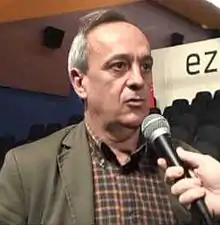Joxe Austin Arrieta
Joxe Austin Arrieta Ugartetxea (born 26 October 1949) is a Basque writer and translator.
Joxe Austin Arrieta | |
|---|---|
 | |
| Born | 26 October 1949 Donostia, Gipuzkoa |
| Occupation | translator |
| Language | Basque |
| Nationality | Spanish |
Life
Arrieta was born in Donostia, Gipuzkoa. He obtained a degree in Philosophy and Literature (Romanic Philology). From 1982 until he retired, he worked at a bank as a translator. He has been a teacher and a lecturer at the EUTG School of Languages and Philosophy. He has also worked in other areas of Basque culture, collaborating with associations like UZEI and UEU.[1]
He has taken political positions in the field of culture and Basque language.[1]
He has written poetry and narrative and has also excelled as a literary translator. His first published work was Bidaia-Termitosti (Ustela, 1978) a book of short stories. After that, in 1979, Arrieta published his first novel, Abuztuaren 15eko bazkalondoa. Among his poetry books, Mintzoen mintzak (Elkar, 1989) and Graffitien ganbara (Kutxa, 1995) stand out.[2] But Arrieta is also a renowned translator and has translated works from French, English, Catalan and German languages into Basque: the play by Marguerite Yourcenar, Memoirs of Hadrian,[1] Lord of the flies by William Golding and Homo Faver, by Max Frisch.[3]
Works
Narratives
- Bidaia - Termitosti (1978, Ustela)
- Labur aroz (1997, Txalaparta)
Novels
Poetry
- Arrotzarena neurtitz neurgabeak (1983, GAK)
- Bertso-paper printzatuak (1986, Elkar)
- Mintzoen mintzak (1989, Elkar)
- Graffitien ganbara (1996, Kutxa fundazioa)
- XX. mendeko poesia kaierak (2001, Susa): Koldo Izagirreren edizioa
- Orbaibar (2003, Kutxa Fundazioa)
References
- interaktiboa, 2011 iametza. "Euskal Idazleen Elkartea. Idazleak". www.idazleak.eus. Retrieved 2017-09-06.
- "Txalaparta publishing". Retrieved 2017-09-12.
- "Auñamendi Eusko Entziklopedia. Literary figures". Retrieved 2017-09-12.